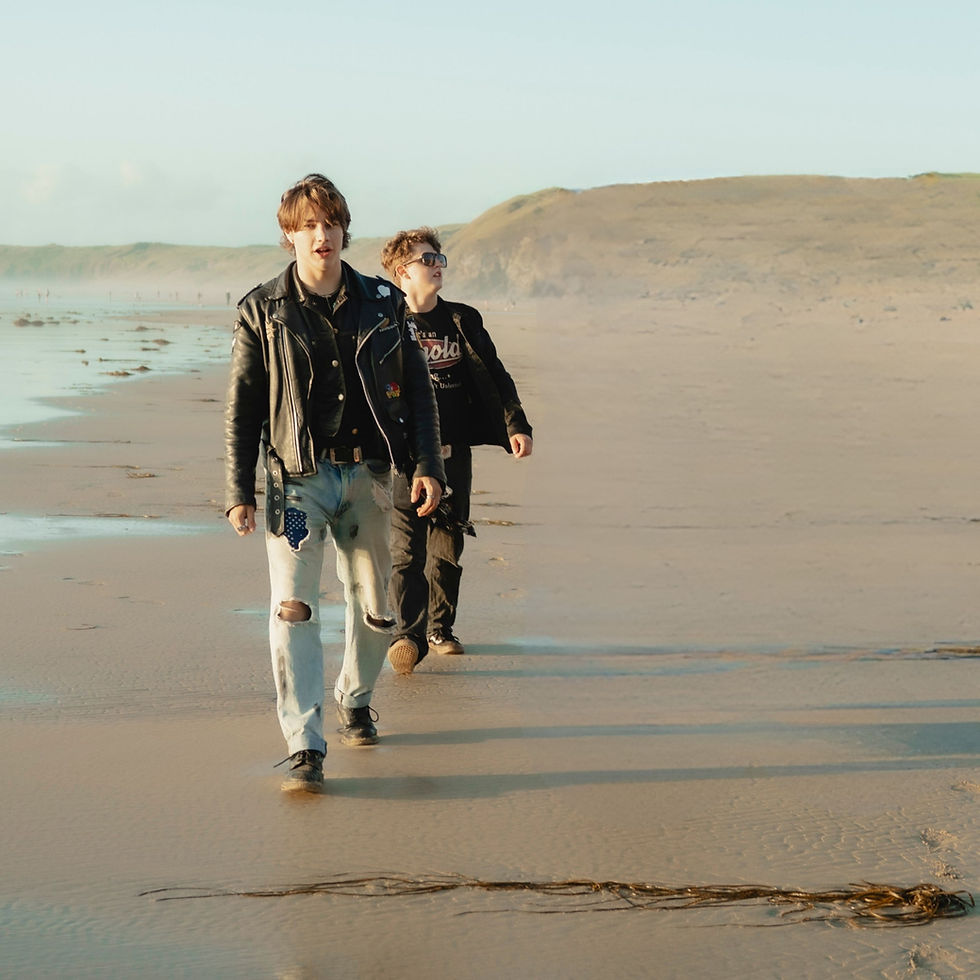5 Songs I Love w/ Malakye Grind
- FLEX Team
- Nov 7, 2024
- 6 min read

Just off the release of their sophomore record, Dystopian Dream, Malakye Grind are powering forth into the rock music world with a conviction we've been waiting to see.
Their lead single "Into The Night" has just surpassed a whopping 30k streams in its first month, with the band releasing "Every Day Is Perfect" as the subsequent lead single off the album. Paired with their distinctive classic rock sound and a message that explores the tension between personal agency and the societal pressures to project perfection.
Malakye Grind shares 5 songs that inspired their latest record. Check it out here:
Tool – "Lateralus"
Released in 2001 on their groundbreaking Lateralus album, this track has become an iconic piece in progressive rock and metal, pushing boundaries in every way.
From a bass player’s perspective, “Lateralus” is both a challenge and an inspiration. Justin Chancellor’s tone is gritty, perfectly counterpoint and super creative. This whole album became with ‘driving home’ soundtrack when I was finishing a degree in Jazz Studies and this song in particular was a personal fav from the album. I’m stoked to have brought some of the influence and impact that this song had into ‘Dystopian Dream’, the title track from our new LP.
The rhythmic interplay in “Lateralus” is one of its defining features, and the song is famous for its intricate time signatures. The chorus shifts from 9/8 to 8/8 to 7/8, originally leading the band to nickname it “9-8-7.” Drummer Danny Carey later realized that 987 is the 16th number in the Fibonacci sequence, which became a theme throughout the song. The time signatures and Fibonacci-inspired structure give the track a natural, spiralling rhythm that feels almost otherworldly.
Maynard James Keenan’s lyrics bring an added layer of depth to “Lateralus.” Thematically, they draw from archetypal stories in North American aboriginal traditions, where colors like black, white, red, and yellow represent creation and transformation. His line “As below so above and beyond, I imagine” references Hermeticism and the Emerald Tablet, weaving spiritual and philosophical ideas into the song. Additionally, Maynard used the Fibonacci sequence in the syllable structure of the verses, ascending and descending along the sequence (1-1-2-3-5-8-5-3) to reflect the infinite possibilities he explores in the lyrics. This intentional mathematical approach to both melody and meaning creates a layered experience that’s as much felt as it is heard.
The song’s arrangement is a journey in itself, moving from moments of quiet introspection to explosive energy, all while maintaining a sense of cohesion. Malakye Grind wanted to continue to explore the concept of ‘nothing to everything” in regard to textural variety with this new LP and TOOL are masters of this.
“Lateralus” is one of those pieces that’s had a lasting impact on my playing and writing, reminding me to push past the familiar and search for the creation of something that is brave enough to break a mold and compose to a songs sentiment not just what is safely predictable.
Deep Purple – "Black Night"
“Black Night,” released in 1970, is a track that’ll always have a special place for me—it was the very first song I learned on guitar.
The riff is so infectious, full of grit and groove, and from the moment I first heard it I was inspired to learn it. I asked my older brother Peter, an artist in his own right, to teach me, and I can still remember the feeling of finally nailing the opening notes. There’s something about Ritchie Blackmore’s playing that’s both sharp and soulful, striking this perfect balance between rock power and bluesy smoothness. He made it look effortless, but every note feels deliberate, like it’s placed exactly where it should be.
Learning “Black Night” was more than just figuring out the chords and notes—it was an introduction to the energy and swagger that rock guitar could have. That riff is timeless; it’s like an invitation to the world of classic rock and blues.
“Black Night” is one of Deep Purple’s signature tracks, built around a riff that’s become legendary in rock history. The riff was crafted by guitarist Ritchie Blackmore, inspired by the simplicity and groove of blues but charged with Deep Purple’s distinct rock edge. With members Ian Gillan on vocals, Jon Lord on keyboards, Roger Glover on bass, Ian Paice on drums, and, of course, Blackmore on guitar, Deep Purple were already redefining hard rock, and “Black Night” showed just how powerful a simple, catchy riff could be.
For me, “Black Night” isn’t just a classic song—it’s the first song that I played over and over until I got it right as a kid. I was hooked the moment I heard it, and having my brother teach me left an indelible mark on my memory of learning music.
Blackmore’s playing has a raw, bluesy groove to it that’s deceptively simple but packed with attitude. Learning that riff opened my eyes to what guitar could be, blending heaviness with this tight, unshakable rhythm. Even now, that simple riff reminds me of why I picked up guitar in the first place, and that thread of simple, heavy riffs still comes through 35 years later in the sounds we make as a band.
Led Zeppelin – "Since I’ve Been Loving You"
Featured on their 1970 album Led Zeppelin III, “Since I’ve Been Loving You” is a personal touchstone for me and a defining moment in rock and blues.
As a guitarist, Jimmy Page’s work on this track feels nothing short of transformative. The song just oozes with emotion, and his phrasing captures this intense, lived-in storytelling—like he’s channeling something deep and raw with every note. That tone he creates, with its perfect blend of warmth and edge, is haunting, and it still hits me as hard as it did the first time I heard it.
Then there’s that solo. From the opening notes, it pulls you in, completely unfiltered and yet so deliberate. Page bends and holds notes like he’s drawing the sound out of some place beyond the strings, pushing the guitar’s voice to its limits. It’s like he’s having a conversation with each note, and that intimacy is what makes this solo unforgettable. It’s one of those moments in music where you realize just how much a guitarist can say without words.
This song isn’t just a favorite of mine; it was a turning point in my own playing and writing. It pushed me toward a more introspective phase, guiding me as I wrote what would become "Dystopian Dream" with Malakye Grind.
Led Zeppelin – "Ramble On"
Released in 1969 on their iconic Led Zeppelin II album, “Ramble On” has become one of the defining tracks in rock history, and its influence has subtly weaved its way into my bass playing and the Malakye Grind sound ever since we were teenagers.
The song has this timeless quality that captures Zeppelin’s unique blend of folk and hard rock, and it’s packed with both intensity and soul. I’m captivated by Robert Plant’s vocals—the way he brings this mystical, storytelling energy to the track with a voice that feels equal parts raw and refined. His lyrics are poetic and reflective, and you can sense his connection to the Tolkien-inspired imagery woven into the song.
Jimmy Page’s guitar work is phenomenal here. The arrangement on Ramble On is all about subtlety and finesse—rather than overpowering, Page layers in these delicate yet powerful acoustic and electric parts that somehow blend flawlessly. It’s a masterclass in how to bring acoustic and electric together without losing the emotion of either. And that solo… every time, it’s like hearing it for the first time.
Bassist John Paul Jones brings a grounded, melodic groove that keeps the whole track moving. He’s not just playing support; he’s adding a unique voice that ties the rhythm and melody together. The way he plays with texture and rhythm here is something I’m constantly inspired by as a bassist.
John Bonham’s drumming is nothing short of groundbreaking, as always. You can feel the soul and force in every beat, yet he holds back just enough to let the song breathe. Bonham’s restraint in this track is remarkable—it’s not about overpowering the sound but adding this heartbeat, this intensity that only he could create.
Ramble On” has had a decade-long influence on my bass playing and songwriting, particularly shaping our track “Say the Words” on Malakye Grind’s Music for Midnight People LP.
Idles - "Colossus"
“Colossus,” the opening track of Joy as an Act of Resistance. blistering, defiant anthem that feels both monumental and intimate—a collision of noise, rage, and vulnerability. Watching the video for the first time I was completey hooked.
As a singer I love distorted bass and songs that build from nothing to Everything. This song ticks both boxes. Bassist Adam Devonshire’s brooding, rumbling lines creating tension. Joe Talbot's baritone vocals are laden with personal and cultural references, from childhood trauma to toxic masculinity. “I am my father’s son, his shadow weighs a ton,” The first half is almost like a doors song in terms of tension and darkness.
The track’s slow burn escalates into chaos halfway through, as a cacophony of guitars and drums crashes in like a sonic tidal wave. The transition into the second half is abrupt, but intentional—it’s a release of all the tension the band has been methodically winding up. Suddenly, Talbot’s sneering delivery shifts, the pace quickens, and what started as a trudging anthem of restraint becomes a furious punk assault.
I love the way the two halves of this song don’t go together musically but they make it work and its my favorite transition of any song ever. The first half of this song influenced the track "Dystopian Dream" and the second half of "The Not List".
Listen to Malakye Grind's record, Dystopian Dream:




Comments